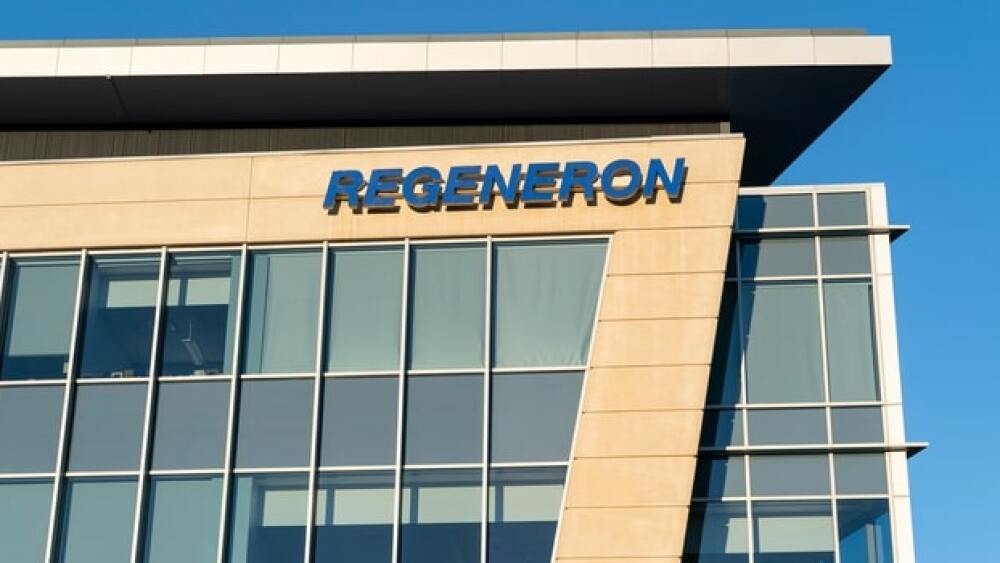The positive findings were shared as part of the company’s Emergency Use Authorization submission for its investigational COVID-19 therapy.
lev radin / Shutterstock
Results from Regeneron Pharmaceuticals’ ongoing Phase II/III trial shared Thursday with the U.S. Food and Drug Administration (FDA) show the company’s antibody cocktail, REGN-COV2, significantly reduced viral load and need for additional medical visits in outpatients with COVID-19. The positive findings were shared as part of the company’s Emergency Use Authorization (EUA) submission for its investigational COVID-19 therapy.
“Today’s analysis, involving more than 500 additional patients, prospectively confirms that REGN-COV2 can indeed significantly reduce viral load and further shows that these viral reductions are associated with a significant decrease in the need for further medical attention,” George D. Yancopoulos, M.D., Ph.D., Regeneron’s president and chief scientific officer, said in a press release.
The company’s investigational COVID-19 antibody cocktail consists of two non-competing antibodies that bind non-competitively to the receptor binding domain of spike protein on the SARS-CoV-2 virus. This may reduce the ability of mutant viruses to circumvent therapy.
Previously, the company reported positive findings from a descriptive analysis of its randomized, double-blind trial involving its first 275 patients dosed with REGN-COV2. Results from this analysis showed the therapy also reduced viral levels and improved symptoms in non-hospitalized patients with COVID-19. The greatest improvements were observed in patients who did not have an immune response prior to therapy. “The first job of an antiviral therapeutic drug is to lower the viral load, and our initial data in 275 patients strongly suggested that the REGN-COV2 antibody cocktail could lower viral load and thereby potentially improve clinical outcomes,” Yancopoulos said.
The new findings shared with the FDA involve an additional 524 patients and show the trial met all of its first nine virologic endpoints as well as the key clinical endpoint of COVID-19-related medically attended visits.
For the primary endpoint, there was a 0.68 log10 copies/mL greater reduction in the mean daily change in viral load through day seven in patients with high viral load treated with REGN-COV2 compared with patients treated with placebo (p<0.0001). Patients treated with REGN-COV2 also had a greater than 10-fold reduction in viral load by day five compared with patients treated with placebo.
In addition, the mean daily reduction in viral load through day seven in patients with detectable virus at baseline was greater in patients treated with REGN-COV2 (p=0.0003). Patients who had a higher viral load at baseline and/or no detectable antibodies at baseline experienced greater benefit from Regeneron’s antibody cocktail, the company noted.
Overall, in 799 patients in the trial, treatment with REGN-COV2 was associated with a 57% reduction in COVID-19-related medical visits through day 29, which was significantly greater than that observed in the placebo group (p=0.024).
In the overall population, patients with one or more risk factor for poor outcomes, including overweight and having a comorbidity, experienced a significantly greater reduction in COVID-19-related medical visits if they were treated with REGN-COV2 (p=0.0065). The reduction in the need for medical visits related to the virus was 72% in patients treated with the antibody cocktail.
“We continue to see the strongest effects in patients who are most at risk for poor outcomes due to high viral load, ineffective antibody immune response at baseline, or pre-existing risk factors,” Yancopoulos said.
Regeneron’s antibody cocktail has been hot news for months, but received a bolstering in publicity after President Trump, who received a COVID-19 diagnosis in October, received eight grams of the experimental drug early in the course of the infection.
Sean Conley, President Trump’s physician, stated several days later that the president’s lab results showed “detectable levels” of antibodies in the blood. While these findings were met with skepticism, President Trump urged regulators in a Twitter video message to approve the EUA for Regeneron as well as Eli Lilly’s antibody therapies.
While the new results from Regeneron’s Phase II/III trial appear promising, the company has stated it currently has only 50,000 available for public distribution and an approximate manufacturing capacity of 50,000 per month. If approved, the therapy will likely be initially administered as a prophylactic therapy for at-risk patients, including the elderly, patients with comorbidities, and medical personnel.





